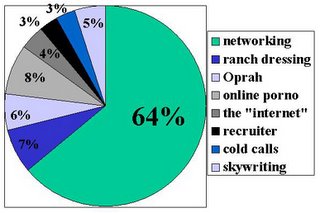Casual assertions mixed with false specificity brought corporate Powerpoint presentations to mind:
- 64% of jobs are gotten through "networking"
- 80% of people don't like their jobs
- 25% of your job is what you are actually good at or like
- the chances of getting a job via the "internet" is 16% or 4%, depending on the day of the seminar, and is greater if you are "technical"
It is apparently insufficiently authoritative to say that "many", or even "most" jobs are gotten through people you know as opposed to "cold" contacts--it has to be backed up by a "statistic"--64%. Whose specificity (not 61%, or 66%), and presentation as a pie chart, implies that quantifiable data is available to prove the point. When in fact 64% is simply shorthand for "many", or "most". The problem with saying "many" or "most" is that the statement is then self-evident. Of course most jobs are gotten through people you know! Thus the old definition of sociology as the science of belaboring the obvious.
The term "networking" is bloviation--so nebulous as to be useless. As evidence of its value we are asked in turn how we got our current jobs and sure enough, for the most part we got them through somebody we knew. But hearing about a job by chance, a common occurrence 20-30 years ago during various hiring booms, and actively hunting down leads now in a diminished job market through your various contacts, are quite different activities, and should not both be called "networking". The former (hey they're looking for people with a pulse at DEC!) should not be used to pad the "statistic" of the likelihood of success of the latter.
And the question is posed, if 64% of jobs are gotten by networking, and only 36% are gotten by other means such as the "internet" or cold calling, why do people spend a disproportionate amount of time pursuing these unlikely means, rather than on networking?
The "pie chart of shame":
 To which we answer, slightly ashamed at having been exposed foolishly looking for jobs in the wrong place duh, we don't know...but the question is an assertion we didn't agree to in the first place. Who says people spend more time doing cold calls or looking on the internet, than "networking"? Where did you get this statistic?
To which we answer, slightly ashamed at having been exposed foolishly looking for jobs in the wrong place duh, we don't know...but the question is an assertion we didn't agree to in the first place. Who says people spend more time doing cold calls or looking on the internet, than "networking"? Where did you get this statistic?
When, at the risk of seeming to be a churl or an ingrate, you challenge the premise behind these assertions the response, in a patronizing manner, is well for you technical types, we realize that the whole thing is more an art than a science, and that these numbers are just to "give you an idea". As if you were a geek wearing a Star Trek uniform and rubber Spock ears shouting in an adenoidal whine, "statistical anomaly! statistical anomaly!"
A company such as ROFL whose business is coaching the art of the job search must for credibility's sake appear to be scientific in its approach. Just don't look too closely.
This is not to say that you should not pursue leads through the people you know. This is to say that it is obvious, and that we should stop using the term "networking" to describe this self-evident activity.

No comments:
Post a Comment